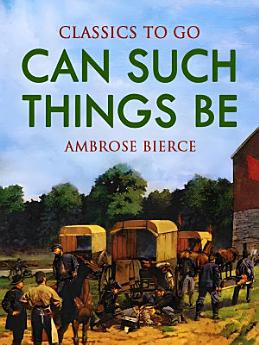Can Such Things Be?
Nov 2017 · Otbebookpublishing
Ebook
232
Pages
family_home
Eligible
info
reportRatings and reviews aren’t verified Learn More
About this ebook
Discover "Can Such Things Be?" by Ambrose Bierce, an anthology that invites readers into a realm where the supernatural intertwines with the ordinary, challenging perceptions of reality. Set in early 20th-century America, these tales explore profound themes such as death, identity, and the mysterious forces that influence our lives. In "The Death of Halpin Frayser," Bierce crafts a chilling narrative of life and the afterlife, while "The Moonlit Road" offers an unsettling journey into the eerie unknown. Each story in this collection, including the titular "Can Such Things Be?", captures the uncanny with a masterful blend of atmospheric tension and psychological depth. Bierce's vivid prose and ability to evoke both fear and wonder make this collection a captivating exploration of the human condition's darker facets. Readers will find themselves questioning the boundaries of the seen and unseen, as apparitions reveal secrets and the past refuses to remain buried. This anthology is more than a series of ghost stories; it is a timeless examination of the unseen forces that shape our existence, ensuring its status as a classic in American literature. Perfect for fans of paranormal fiction and short stories, "Can Such Things Be?" remains relevant today, offering universal themes that resonate with the curious mind. Dive into this collection and experience Bierce's unparalleled storytelling, where each tale is a journey into the unknown, challenging your understanding of the world.
About the author
Ambrose Bierce, born on June 24, 1842, in Meigs County, Ohio, was a master of wit and a pioneering figure in American literature. Known for his sharp, sardonic style, Bierce's work often delved into the darker aspects of human nature and the absurdities of society. His most famous work, "The Devil's Dictionary," showcases his talent for turning a phrase and his deep cynicism about human motives and institutions.Bierce's life was as tumultuous as his prose. He served with distinction in the Union Army during the Civil War, an experience that profoundly influenced his later writings. His short stories, particularly "An Occurrence at Owl Creek Bridge," are celebrated for their innovative narrative techniques and psychological depth, prefiguring modernist literature.A journalist by trade, Bierce's biting critiques and fearless reportage earned him the nickname "Bitter Bierce." His column in the San Francisco Examiner was a platform for his unflinching social commentary and satirical attacks on corruption and incompetence. This often placed him at odds with powerful figures, making him a controversial figure in his time.Bierce's mysterious disappearance in 1913, after traveling to Mexico to observe the Mexican Revolution, adds a layer of intrigue to his already fascinating life. His influence can be seen in the works of later writers like H.P. Lovecraft and Kurt Vonnegut, who admired his ability to blend dark humor with profound philosophical insights. Bierce remains a compelling figure for modern readers, embodying the restless spirit of inquiry and skepticism that continues to resonate today.
Rate this ebook
Tell us what you think.
Reading information
Smartphones and tablets
Install the Google Play Books app for Android and iPad/iPhone. It syncs automatically with your account and allows you to read online or offline wherever you are.
Laptops and computers
You can listen to audiobooks purchased on Google Play using your computer's web browser.
eReaders and other devices
To read on e-ink devices like Kobo eReaders, you'll need to download a file and transfer it to your device. Follow the detailed Help Center instructions to transfer the files to supported eReaders.








